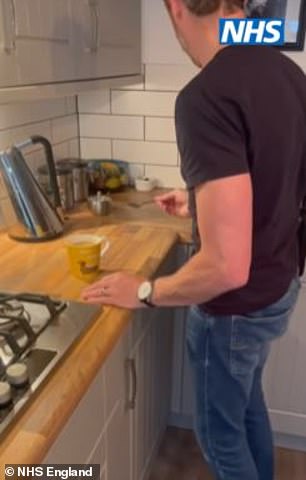[ad_1]
Incredible footage reveals how one man’s life has been transformed after taking a breakthrough drug which curbs debilitating Parkinson’s tremors.
The clip, shared by the NHS, shows how taking Produodopa has transformed 52-year-old Damien Gath’s life.
At the start of the video, Damien, who was diagnosed with Parkinson’s disease just over 12 years ago, struggles to make a cup of tea due to his tremors.
A voice over explains: ‘In 2024, he started a revolutionary new treatment to manage his symptoms.’
The video then shows him, ‘just two days later’ making a cup of tea and this time the improvement was extraordinary’.
Now, they continued: ‘Nine months on, Damian has a renewed sense of purpose, is back at work, and is sharing his experiences, and fighting the progression of Parkinson’s.’
‘It’s been extraordinary and life-changing—the massive difference is that there are now no fluctuations,’ said Mr Gath.
The end of the clip even incredibly shows Mr Gath at a gym, now able to do a fitness workout.


The video posted by the NHS on Instagram shows it has completely transformed Damien’s life
In the comment section, social media users were left stunned by his impressive transformation.
One user wrote: ‘What a difference!! Now these are the NHS stories I love hearing about!! Wishing him all the very best.’
Another user commented: ‘Science is magic.. This is incredible to witness. May more breakthroughs change more lives.’
Meanwhile a third user wrote: ‘This is phenomenal for this man. Amazing.’
The key to this incredible transformation lies in a black rectangular device worn on Damien—a portable pump that slowly releases a drug called foslevodopa- foscarbidopa (or Produodopa).
It works increasing the amount of a hormone called dopamine in the brain, which is involved with movement and mood.
In Parkinson’s disease, which affects 145,000 Brits, brain cells responsible for making the hormone die off, leading to a deficiency.
While other medicines are currently available, patients with severe disease often have to a concoction of several pills to feel relief. Many find that their symptoms worsen in the evening once the effect of the medication has worn off.

Symptoms can include uncontrollable tremors, slow movements and muscle stiffness, but experts say they often only appear when about 80 per cent of the nerve cells have been lost
But the Produodopa infusion delivers a steady stream of medicine throughout the day and night, entering the patient’s bloodstream through a cannula under the skin that is controlled by a small, automatic pump.
Mr Gath was one of the first patients at NHS Sherwood Forest Hospitals Trust to receive what he called a life-changing medication, which costs the NHS £31,000 per person, per year.
Speaking to the Daily Mail, Dr Rob Howard, a professor of Old Age Psychiatry at University College London said, while it can improve symptoms and control them for a longer time ‘it can’t reverse the disease’.
This is because, he explained: ‘In Parkinson’s, nerve cells die in a part of the brain that produces a neurotransmitter, dopamine, that controls movement.
‘Drug treatments like this can help replace the levels of dopamine to compensate for the loss of brain cells and this improves the control of symptoms.
‘This can give the appearance of “reversing” Parkinson’s, but unfortunately, we still don’t have any treatments that slow or stop the death of important nerve cells that cause the disease.’
Parkinson’s is a disease in which parts of the brain become progressively damaged over years.
This leads to people suffering from tremors and stiff and inflexible movements that can eventually rob them of their independence.
Patients can also, as a consequence of their disease, suffer from other problems like depression and anxiety.
What triggers the brain changes that lead to Parkinson’s is unknown and while there are treatments available there is no cure.
Patients can also respond differently to treatments — some find drugs offer a solution whereas for others they fail to work.
In Mr Gath’s case his condition had deteriorated, and he was on a cocktail of four medications six times a day to try and bring his involuntary movements under control.
But these had mixed success, and he particularly suffered at night when the dosage began to wear off.
However, thanks to the new portable pump he said he is now resting much better.
‘I am also sleeping much better, and the duvet doesn’t feel like a ton weight on my legs—I can turn over when I want to,’ he previously said.
[ad_2]
This article was originally published by a www.dailymail.co.uk . Read the Original article here. .

